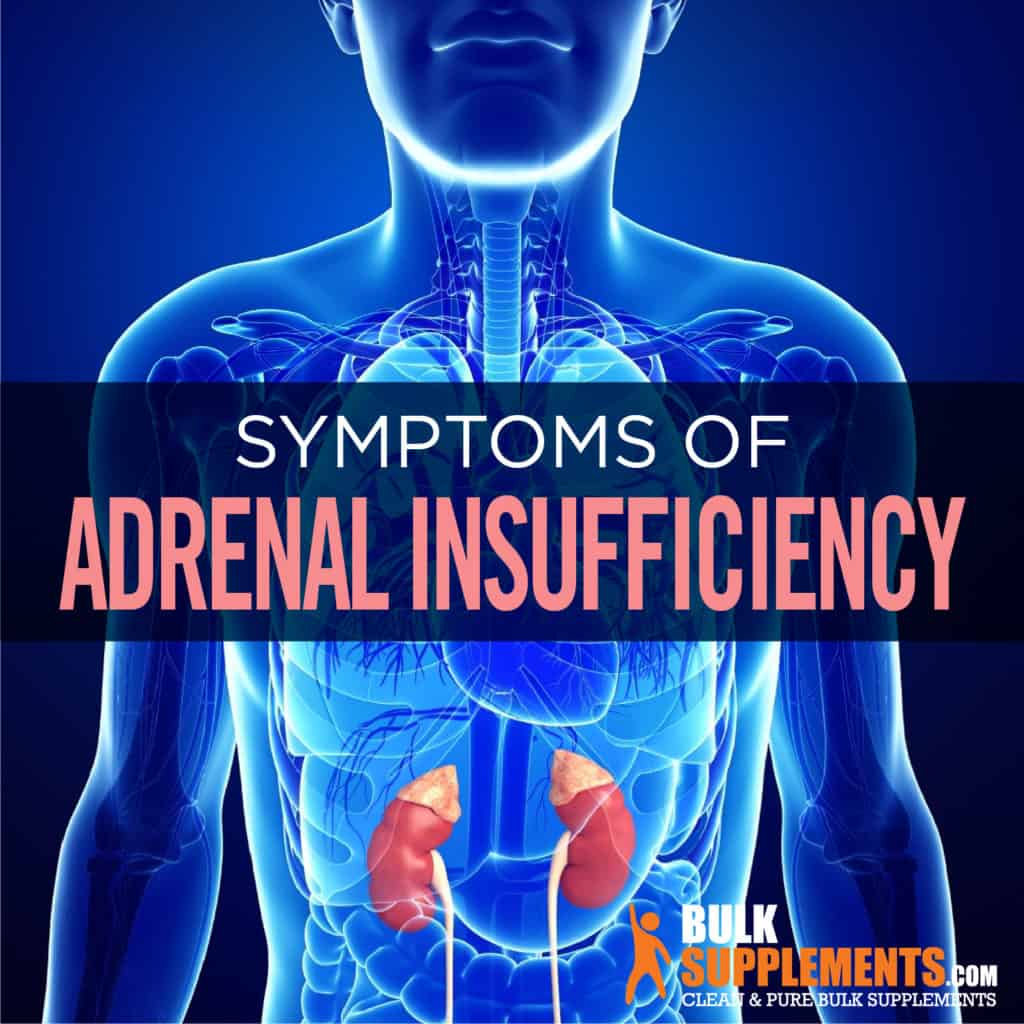What is Adrenal Insufficiency?
Adrenal insufficiency, commonly known as Addison’s disease, is a rare but serious condition. It occurs when your adrenal glands don’t produce enough cortisol, a hormone that works overtime to keep your body healthy. The condition is characterized by weight loss, joint pain, nausea, vomiting, diarrhea, dry skin, low blood pressure and fatigue.
There are two forms of adrenal insufficiency — primary and secondary. Your doctor will need to do blood work to give you a diagnosis.
One common misconception is that adrenal fatigue and adrenal insufficiency are the same condition. But in fact, they’re actually two different conditions (x). Unlike adrenal insufficiency, adrenal fatigue is not a recognized disease.
So what’s the difference? How do you know if you have adrenal insufficiency? And how can you treat it?
What Are Adrenal Glands?
You have two adrenal glands, located on top of your kidneys. These tiny structures locate crucial hormones for your body, such as cortisol and aldosterone (x).
What Is Adrenal Failure?
Adrenal failure is a life-threatening condition in which your body stops producing enough hormones. Untreated Addison’s disease (adrenal insufficiency) can cause this serious condition. Adrenal failure symptoms include severe weakness and pain, diarrhea and confusion (x).
What is Adrenal Fatigue?
Defining this condition isn’t easy because some doctors believe it doesn’t even exist. Moreover, blood work can’t even detect this condition, and its symptoms vary from patient to patient. It may, however, be associated with chronic infections like bronchitits, flu or pneumonia.
The symptoms of adrenal fatigue like poor sleep or increased nervousness, do not match those of chronic adrenal insufficiency. The Endocrine Society does not recognize adrenal fatigue as a distinct disorder (x). At the present time, there is no way to test for this particular condition.
Symptoms of Adrenal Insufficiency
In general, when the delicate balance of the body’s stress responses are disrupted, health issues arise. If you have this condition, you may notice mild symptoms that gradually worsen. At first your symptoms may mirror those of other diseases. This can make adrenal insufficiency hard for your doctor to diagnose.
Adrenal insufficiency symptoms include:
- Nausea, vomiting and diarrhea
- Muscle pain or weakness
- Increasing fatigue
- Low blood pressure, causing dizziness and sometimes fainting
- Weight loss
- Hyperpigmentation
- Irritability and depression
- Hair loss
- Salt cravings
If you notice any of the above symptoms, call your doctor immediately. If Addison’s disease progresses, your life may be at risk.
Testing for Adrenal Insufficiency
Your doctor may administer one or both of these tests to measure hormone levels in your body (x):
- ACTH stimulation: Your doctor will measure blood hormone levels after giving you a synthetic hormone.
- Insulin-induced hypoglycemia: This test measures how your adrenal glands handle stress. Your doctor will inject fast-acting insulin into your bloodstream to measure how cortisol and blood-sugar levels respond to it.
Causes of Adrenal Insufficiency
- Autoimmune disorders can cause primary adrenal insufficiency.
- Although unusual, infections like tuberculosis can also cause Addison’s disease.
- Certain medications such as prednisone can cause secondary adrenal insufficiency, which may also occur if doctors remove tumors on the pituitary glands. Secondary adrenal insufficiency is usually temporary but still requires attention.
Remedies and Supplements for Adrenal Insufficiency
Cortisol deficiency is linked to adrenal insufficiency, and hydrocortisone replacement therapy is a common form of treatment. Cortisol is critical to a wide range of physiological functions including metabolism, immune response and blood sugar levels. It not only helps our cognitive processes, but influences how our bodies respond to stress.
When your body does not produce hormones essential to your body’s normal functions, your doctor may suggest hormone replacement therapy, which involves taking medication that puts cortisol and aldosterone back into your system (x).
Supplements for Adrenal Insufficiency
Commonly used to treat cancer patients suffering from chemotherapy-induced immunosuppression, Ashwagandha can increase energy levels in people suffering from adrenal fatigue and is widely used to balance hormones, improve physical performance and reduce anxiety (x).
Maca Root is rich in protein, fiber, calcium, magnesium and amino acids such as arginine and glycine. Maca root can help manage symptoms of adrenal fatigue (x). As a matter of fact, consistent use of maca root can nourish and stimulate the hypothalamus and pituitary glands, and thus restore balance to the adrenal glands.
Rhodiola rosea stabilizes cortisol levels and helps the body adapt to stress. As can be seen, when we experience high levels of stress, cortisol levels spike and cause a host of health problems. On the positive side, rhodiola rosea has been shown to promote relaxation and alleviate anxiety because it regulates the body’s production of cortisol. On the other hand, it may act as a stimulant and provide you with a boost in energy (x).
Replenish your body with good nutrition
For the most part, the foods you eat are a critical part of healing your adrenals and restoring hormonal balance. If you have adrenal insufficiency, you’ll need lots of vitamins and minerals as part of a nutritious diet. The primary goal of good nutrition is to increase your level of energy naturally. Coffee, white flour and sugars of any kind may be taxing on your system — especially on your adrenal glands, so it is best to avoid them. Keep your body hydrated regularly with water rather than soda, juice or energy drinks.
Lifestyle
Adrenal insufficiency is a serious condition, so be kind to yourself. Spend some time throughout the day walking outside, sitting quietly or doing gentle yoga poses to promote relaxation. All things considered, these small lifestyle changes help repair and restore a sense of balance. Henceforth, changes you make today can bring you closer to regaining vibrant health.
The Bottom Line
Adrenal insufficiency is a serious, life-threatening medical condition. To treat it, you’ll need medication, rest and a healthy diet. Expect your doctor to monitor your symptoms closely, and remember that with dedicated medical care, you can manage Addison’s disease safely and effectively.
